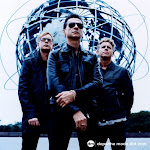quinta-feira, 14 de fevereiro de 2013
quarta-feira, 6 de fevereiro de 2013
Opinião de quem ja ouviu...
David Gahan quietly lurked, death-disco pounded on
Depeche Mode frontman David Gahan quietly attended a listening party for Delta Machine, his band's upcoming 13th album, held last night at a posh Manhattan nightclub in Chelsea. The album was queued up, and the announcer from Columbia gave some bare facts before pressing play: It's 2013, 13th album, 13 songs, out March 22, and then, "This is their first album with us. We're happy to be working with them." The bar crowd talked loudly through the whole affair and when the final note played, it took a full 15 seconds before anyone noticed the silence. Someone clapped, hoping it wasn't just an electrical outage, and then the whole clan joined in. After another awkward moment, the club's mix kicked back in: "Suit & Tie." Everyone went back to drinking, as if they'd never heard a thing.
Here's what we heard, while sitting alone in a chair inside that sad, dark disco.
1. "Heaven" is a Fake-Out
For some unfathomable reason "Heaven" is the lead single for the album. It follows the template for every Depeche Mode song since producer Ben Hillier's arrival in 2005: a teasing, minimal drum line, bigger-is-better vocals, and a wide stereo chorus. The only thing out of that order here is the painfully slow tempo. A strong bass groove and tight drum fills shape this syrup into near-trip-hop, but Gahan barrels where he should be fragile. It's not a bad song, it's just not the best choice. The good news is that the single is a fake-out: the rest of Delta Machine is harder and weirder.
2. "Should Be Higher" Should Be Higher
This death-disco creeper is by far the best track on the album. All the traditional elements of Depeche Mode get held back or rearranged or sung in falsetto so that, while still classic, the song sounds fresh. It's also the best mix. You know that high whistle on U2's "With Or Without You," the one you can't forget once you hear it the first time? This song has the same thing, only it's a sizzle.
3. There Are More Songs About Faith and Devotion
Martin Gore said that this album would have the vibe of Violator and Songs of Faith and Devotion, which is to say unapologetic pop tinged with blues and guitar. "Slow" and "Goodbye" are his takes on that tradition. The former throws out a big blues guitar line then wanders from the form into a hazy Spiritualized-style gospel choir. The latter is more traditional, a spartan hook turned lush at the chorus. With Flood's mix, it contains lovely musical moments of vocal excess shifting imperceptibly into instruments. For those of you reading song-lyric tea leaves, this track means just the end of album "goodbye, again," a bookend to the inconsequential opener "Welcome To My World."
4. Even Legends Suffer From Anxiety of Influence
Depeche Mode are in their third generation of being the biggest synth band on the planet, and for the last decade that honor has mostly been a songwriting curse. The attempts to put boundaries include the minimal techno track "My Little Universe" that actually mostly works, except when Gahan leaves the ominous reptition of "I let no one in / No one" to sing less pithy cliches. "Soft Touch/Raw Nerve" is a revision of history where DM was more industrial than pop when the instruments were and sounded hard. The less said about "Angel"'s mid-song techno identity crisis, the better.
5. Yes, Virginia, There's a Martin Gore Song
There's always at least one song sung for Team Gore, and this one is a bitter ballad. "The Child Inside" begins with a solemn Mingus-y bass line that adds big synth pads and flourishes of electronics but little percussion. Listening only once amid chatter made it hard to pick up all Gore's narrative, but we did catch this: "I can hear that dreadful sound / Watching from afar I see a child's drowned / The child inside your heart."
@ SPIN
Depeche Mode frontman David Gahan quietly attended a listening party for Delta Machine, his band's upcoming 13th album, held last night at a posh Manhattan nightclub in Chelsea. The album was queued up, and the announcer from Columbia gave some bare facts before pressing play: It's 2013, 13th album, 13 songs, out March 22, and then, "This is their first album with us. We're happy to be working with them." The bar crowd talked loudly through the whole affair and when the final note played, it took a full 15 seconds before anyone noticed the silence. Someone clapped, hoping it wasn't just an electrical outage, and then the whole clan joined in. After another awkward moment, the club's mix kicked back in: "Suit & Tie." Everyone went back to drinking, as if they'd never heard a thing.
Here's what we heard, while sitting alone in a chair inside that sad, dark disco.
1. "Heaven" is a Fake-Out
For some unfathomable reason "Heaven" is the lead single for the album. It follows the template for every Depeche Mode song since producer Ben Hillier's arrival in 2005: a teasing, minimal drum line, bigger-is-better vocals, and a wide stereo chorus. The only thing out of that order here is the painfully slow tempo. A strong bass groove and tight drum fills shape this syrup into near-trip-hop, but Gahan barrels where he should be fragile. It's not a bad song, it's just not the best choice. The good news is that the single is a fake-out: the rest of Delta Machine is harder and weirder.
2. "Should Be Higher" Should Be Higher
This death-disco creeper is by far the best track on the album. All the traditional elements of Depeche Mode get held back or rearranged or sung in falsetto so that, while still classic, the song sounds fresh. It's also the best mix. You know that high whistle on U2's "With Or Without You," the one you can't forget once you hear it the first time? This song has the same thing, only it's a sizzle.
3. There Are More Songs About Faith and Devotion
Martin Gore said that this album would have the vibe of Violator and Songs of Faith and Devotion, which is to say unapologetic pop tinged with blues and guitar. "Slow" and "Goodbye" are his takes on that tradition. The former throws out a big blues guitar line then wanders from the form into a hazy Spiritualized-style gospel choir. The latter is more traditional, a spartan hook turned lush at the chorus. With Flood's mix, it contains lovely musical moments of vocal excess shifting imperceptibly into instruments. For those of you reading song-lyric tea leaves, this track means just the end of album "goodbye, again," a bookend to the inconsequential opener "Welcome To My World."
4. Even Legends Suffer From Anxiety of Influence
Depeche Mode are in their third generation of being the biggest synth band on the planet, and for the last decade that honor has mostly been a songwriting curse. The attempts to put boundaries include the minimal techno track "My Little Universe" that actually mostly works, except when Gahan leaves the ominous reptition of "I let no one in / No one" to sing less pithy cliches. "Soft Touch/Raw Nerve" is a revision of history where DM was more industrial than pop when the instruments were and sounded hard. The less said about "Angel"'s mid-song techno identity crisis, the better.
5. Yes, Virginia, There's a Martin Gore Song
There's always at least one song sung for Team Gore, and this one is a bitter ballad. "The Child Inside" begins with a solemn Mingus-y bass line that adds big synth pads and flourishes of electronics but little percussion. Listening only once amid chatter made it hard to pick up all Gore's narrative, but we did catch this: "I can hear that dreadful sound / Watching from afar I see a child's drowned / The child inside your heart."
@ SPIN
Subscrever:
Comentários (Atom)






.jpg)
